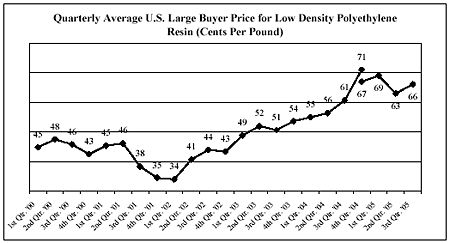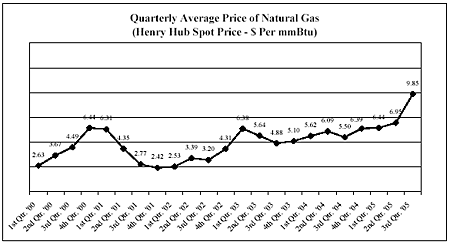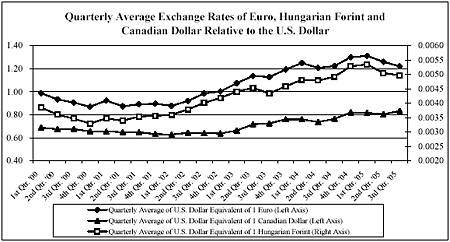Item 2. Management’s Discussion and Analysis of Financial Condition and Results of Operations. Executive Summary Third-quarter 2005 net income was $7.6 million (20 cents per share) compared with $15.3 million (40 cents per share) in the third quarter of 2004. Net income was $15.3 million (40 cents per share) for the first nine months of 2005 compared with $22.9 million (60 cents per share) for the first nine months of 2004. Gains on the sale of assets and other items and losses related to plant shutdowns, assets impairments and restructurings are described in Note 2 on page 6. The business segment review begins on page 20. Third-quarter profits in Film Products improved over last year due primarily to growth in higher value-added products including surface protection, elastic and apertured materials. Given the intense upward pressure on resin costs, and the timing between these rising costs and corresponding price increases, we expect a significant decline in fourth-quarter profits from year-ago levels. The films business has resin index-based pass-through or cost-sharing agreements for the majority of its sales. However, under certain agreements, changes in resin costs are not passed through for an average period of 90 days. For non-indexed customers, Film Products has announced price increases, which it hopes will further mitigate the impact of rising resin costs. In Aluminum Extrusions, operating profit from ongoing operations in the third quarter declined to $4.4 million compared with $7.4 million last year. The profit decline was due to a $2.3 million increase in energy costs and a negative impact of $900,000 caused by appreciation of the Canadian Dollar. Third quarter volume was flat versus last year at 63.9 million pounds as relatively strong performance in U.S. operations was offset by softer demand across all Canadian markets. On June 30, 2005, substantially all of the assets of AFBS, Inc., a wholly-owned subsidiary of Tredegar (formerly known as Therics, Inc.), were sold or assigned to a newly-created limited liability company, Therics, LLC, controlled and managed by an individual not affiliated with Tredegar. AFBS received a 17.5% equity interest in Therics, LLC, valued at $170,000 and a 3.5% interest in Theken Spine, LLC, valued at $800,000, along with potential future payments based on the sale of certain products by Therics, LLC. AFBS retained substantially all of its liabilities in the transaction, which included customary indemnification provisions for pre-transaction liabilities. Tredegar has no obligation or intent to fund any future losses that may occur at Therics, LLC or Theken Spine, LLC. The ownership interest in Therics, LLC is accounted for under the equity method of accounting with losses limited to its initial carrying value of $170,000. The ownership interest in Theken Spine, LLC is accounted for under the cost method, with an impairment loss recognized and a new cost basis established for any write-down to estimated fair value, if necessary. The potential future payments due from Therics, LLC based on the sale of certain products will be recognized as income when earned. Net capitalization and other credit measures are provided in the liquidity and capital resources section beginning on page 22. Critical Accounting Policies and Recently Issued Accounting Standards In the ordinary course of business, we make a number of estimates and assumptions relating to the reporting of results of operations and financial position in the preparation of financial statements in conformity with generally accepted accounting principles. We believe the estimates, assumptions and judgments described in the section “Management’s Discussion and Analysis of Financial Condition and Results of Operations – Critical Accounting Policies” of our Annual Report on Form 10-K for the year ended December 31, 2004, have the greatest potential impact on our financial statements, so we consider these to be our critical accounting policies. These policies include our accounting for impairment of long-lived assets and goodwill, pension benefits and income taxes. These policies require management to exercise judgments that are often difficult, subjective and complex due to the necessity of estimating the |



